
Introduction
“Be you ever so high, the law is above you.” – Lord Denning
Article 14 of the Indian Constitution enshrines the principle that equality forms the foundation of democracy. It directs that the law must treat all persons—powerful or ordinary, Indian or foreign—the same within the territory of India. Consequently, It protects people from arbitrary state laws, ensures fair treatment for those in similar situations, and advances the dream of a just society.
Referred to as the “The soul of Fundamental Rights,” Article 14 combines the principle of equality before the law (a concept originating from British law) and equal protection of laws (a concept originating from American law) to strike a balance between treating equals alike and special measures (reserving spaces) for the upliftment of underprivileged groups.
From quashing arbitrary laws to its role in allowing affirmative action, Article 14 of the Constitution of India is instrumental in shaping Indian democracy with landmark judgments. It continues to inform discussions around reservations, LGBTQ+ rights, welfare legislation as we know it today.
Article 14 of Indian Constitution
According to Article 14 of the Indian Constitution:
“The State shall not deny to any person equality before the law or the equal protection of the laws within the territory of India.”
There are two main parts to the text:
- Equality Before the Law – Nobody is above the law, and everyone is subject to the same legal system. This is negative (it prohibits privileges).
- Equal Protection of Laws – The State must treat people in the same conditions the same and can make reasonable differentiations as needed. This is positive (it permits affirmative action programs such as reservations).
Important point: Article 14 applies to “any person” – so both citizens and non-citizens are provided protection under Article 14.
Equality Before Law: Meaning and Dimensions
The Indian Constitution borrows this concept from the British legal system and treats it as a negative notion—it prohibits the State from granting special privileges or arbitrary exemptions to individuals.
It has three main dimensions:
- No Special Privileges – Nobody, and no groups has any rights or privileges when it comes to the law (with the exception of police and issue of scope).
- No Benefits under the Law – Nobody is above the law (including the president, prime minister, or any other citizen).
- The law shall treat everyone as equal, and it shall place no one above the ordinary laws in force.
Example : In Indira Gandhi v. Raj Narain (1975), the Supreme Court ruled that the Prime Minister was still subject to the law, without any immunity that her office might suggest. In short, power does not grant legal immunity.
Equality before the law means that the law does not bend for anyone; it is equally applied to all and true for all.
Equality of protection of law- Positive equality
For equality before the law denies privilege, the relatively new concept of equal protection of laws (which is borrowed from the American Constitution) is a positive notion – meaning that people in similar situations are treated alike and people in different situations are treated differently when fairness dictates.
Important Aspects of Equal Protection of Laws
- Similar should be treated similarly – People in similar situation should be guided by similar rules.
- Protective discrimination – The State can provide for special provisions for disadvantages groups (e.g., reservations and welfare schemes) to ensure real equality.
- Affirmative action – The government can create policing to support poorly developed / marginalized sections of society. This is substantive equality rather than formal equality.
Case Example: In the State of West Bengal v. Anwar Ali Sarkar (1952) SC, the Supreme Court of India held that classification under Article 14 should be reasonable and not capricious.
The Mandal Commission Report (1980) observed: “There is equality only among equal’s. To treat unequal’s as equal’s is simply to perpetuate inequality.”
In other words, Equal protection of the laws does not mean that everyone should be treated the same – it means that those who need extra support should receive it, so everyone is on an equal footing.
Rule of Law & Dicey’s Theory
The ideation of Rule of Law is the foundation of Article 14. It was popularized by British jurist A. V. Dicey, who described it as a foundational feature of a democratic constitution.
Dicey postulated three essential elements to the Rule of Law:
- Absence of Arbitrary Power – Except for a breach of law, no person shall be punished by the authorities or made subject to lawful interference in their persons.
- Equality Before the Law – Ordinarily, all People irrespective of wealth or poverty, high or low are subject to the same ordinary law of the land, and enforced by the ordinary Courts.
- Supremacy of Legal Rights – Rights are not bestowed by Constitutions; constitutions are made because they give acknowledgement to rights.
Reasonable Classification & Arbitrariness Test
Article 14 does not prevent the State from creating classifications between different classes of people, but it does require that those classifications must be reasonable, not arbitrary.
Two Requirements for Reasonable Classification
- Intelligible Differentia – A rational distinction (Differentia) must exist for the classification in question.
- Rational Nexus – The differentia must have a logical connection to the purpose of the legislation or policy.
Case Examples:
- State of West Bengal v. Anwar Ali Sarkar (1952): Classification must not be arbitrary; it must be valid.
- E.P. Royappa v. State of Tamil Nadu (1974): The Court found that “arbitrariness is as antithetical to equality as are status or special privileges in favour of the privileged“. Equality is not solely about classification, it is about whether the State acted fairly or arbitrarily.
- Maneka Gandhi v. Union of India (1978): Article 14 was interpreted in a much broader sense and classification must be “just, fair and reasonable.”
Exceptions to Equality clause
While Article 14 guarantees equality as a constitutional guarantee, there are certain immunity exceptions expressly permitted in the Constitution whereby equality does not strictly apply.
- Immunity for President and Governors (Article 361): The President and Governors are not to be made answerable in the Courts of law for acts performed during their own official tenure.
- Immunities for Diplomats: Ambassadors, high commissioners, and UN officials will enjoy protections from prosecutions in accordance with both international and national laws.
- Special provision for specifically identified groups: Protective discrimination (like reservations) are seen as instrument of equality, not discrimination.
- Sovereignty & National interest: Some laws or actions of states (ex. with respect to security, foreign relations) may impact restrictions on equality.
In other words: Equality under Article 14 is broad but not absolute — it strains in exceptional cases to permit governance, diplomacy and justice.
Landmark Judgements under Article 14
The Supreme Court extended the meaning of equality by way of several landmark cases.
- State of West Bengal v. Anwar Ali Sarkar (1952): Held arbitrary classification struck down under special criminal law.
- E.P. Royappa v. State of Tamil Nadu (1974): Established that “arbitrariness is antithetical to equality.”
- Maneka Gandhi v. Union of India (1978): Article 14, 19, and 21 had to be treated together and equality should also be a microcosm of fairness and non-arbitrariness.
- Indra Sawhney v. Union of India (1992): Reaffirmed 27% OBC reservations, but limited total reservations at 50%.
- Navtej Singh Johar v. Union of India (2018): Decriminalized Section 377 IPC (homosexuality) on grounds of dignity and equality. But interpretation remains changeable with social realities.
- Joseph Shine v. Union of India (2018): This case invalidated the adultery law (Section 497 IPC) as discriminatory and unconstitutional.
These cases illustrate how Article 14 is not a constant, rigid principle, but a living, breathing principle that transforms and adapts as the world changes around it.
Article 14 and its Current Context
Equality before law is still an inherent part of Indian democracy, but its interpretation is in constant flux to keep up with contemporary social realities:
- Reservations & Social Justice: The ongoing debate surrounding reservations, and the ongoing discussion around the validity of the Economically Weaker Section quota, upheld in Janhit Abhiyan v. Union of India, 2022, demonstrates how equality is being weighed against affirmative action.
- Gender Equality: The striking down of discriminatory practices like triple talaq, and the invalidation of adultery laws, shows how Article 14 serves to advance gender justice.
- LGBTQ+ Rights: The recognition of sexual orientation and the right to dignity through Article 14 highlights modern India’s inclusiveness.
- AI, Technology & Governance: Algorithmic bias, digital exclusion, and the shift to online governance create new forms of equality before the law.
In the current context, Article 14 has transcended from being about “formal equality”, to “substantive equality,” making sure laws, policies and possibly technology-driven governance are fair.
Conclusion: Why Equality is the soul of Democracy
Article 14 is the pulse of the Indian Constitution. Without equality, Democracy would become a shell, because the law would only be for the lawless. From banning untouchability, achieving gender justice, and promoting rights for the LGBTQ+, Article 14 has been the guiding light to an inclusive and just society.
In short, equality is not about treating everyone the same, but about treating everyone fairly. That’s why Article 14 is rightly called the soul of Indian democracy—it ensures that liberty and justice are meaningful for all, not just a privileged few.
FAQs on Article 14
Q1. What is Article 14 in layman’s terms?
No one is above the law. Everyone should be treated equally by the State.
Q2. Whether Article 14 allows reservations?
Yes. The Supreme court has clarified that reasonable classification is permitted. Reservations are a form of positive equality aimed at uplifting the disadvantaged.
Q3. Can Parliament exempt itself from abiding by Article 14?
There are a few exceptions just like the President, Governors, Diplomat have immunities. But laws need to abide by the direction of equality.
Q4. What is the distinction between Equality before Law and Equal Protection of Laws?
Equality before law = Negative concept (not discrimination, not privilege).
Equal Protection of Laws = Positive concept (laws can treat unequals, in a different manner, to get equality).
Q5. Is Article 14 an absolute right?
No . The State can classify and treat certain groups differently. Subject to reasonable classification and not arbitrary.

